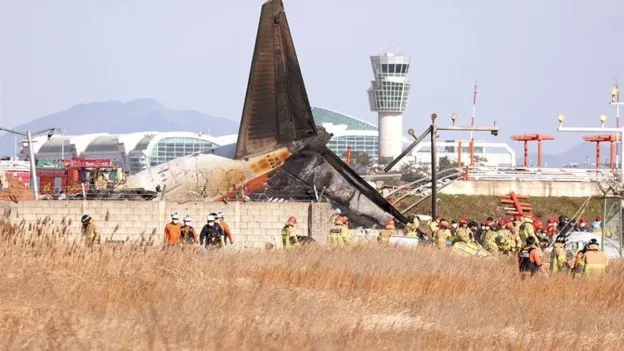
Boeing Faces Scrutiny After Fatal Plane Crash in South Korea

south korea - A Boeing 737-800 aircraft belonging to Jeju Air crashed in South Korea, resulting in 179 fatalities. The incident has raised concerns about the safety record of Boeing, which has faced a series of accidents in recent years.
In the recent plane crash in South Korea involving a Boeing 737-800 aircraft belonging to Jeju Air, 179 individuals lost their lives. The focus has shifted to the aviation giant Boeing, which has been associated with accidents in the past. It was revealed that the Boeing 737-800 aircraft involved in the crash had completed 13 flights in the 48 hours leading to the incident.
The South Korean Ministry of Transport announced that they will be inspecting the 101 Boeing 737-800 aircraft operated by airlines in the country. The crises at the American aviation company Boeing, which has been embroiled in scandals and accidents in recent years, are deepening. Following the crash, the company's stock price dropped by 4%, accumulating a total loss of over 30% in 2024.
Authorities are investigating the cause of the crash, considering the possibility that a bird strike may have led to landing gear issues. The negative track record of the company raises questions about the potential of negligence.
Amid ongoing investigations into the cause of the crash, a Boeing 737 operated by Dutch Royal Airlines veered off the runway during an emergency landing in Norway. Fortunately, there were no casualties. In November, a Boeing 737 cargo plane in Lithuania crashed onto a building near Vilnius airport, resulting in one fatality. In a separate incident in Brazil during the same month, a Boeing 737-400 cargo plane made an emergency landing in Sao Paulo after a fire broke out in the cargo hold.
In another incident in May, a Boeing 737 passenger plane skidded off the runway at an airport in Dakar, Senegal, injuring 10 passengers. On January 5, an Alaska Airlines Boeing 737 MAX 9 experienced a mid-air emergency when its emergency exit door exploded. A subsequent investigation revealed a manufacturing defect on the aircraft.
Experts emphasize the importance of avoiding concrete walls in case of a runway excursion and highlight the necessity of preparedness at the scene for situations where landing gear fails to deploy. They underscore the significance of proactive measures such as foam dispersal and on-site fire brigade readiness.
A potential disaster was narrowly averted in South Korea as another Jeju Air aircraft of the same model landed in Gimpo International Airport due to a similar malfunction.
The safety reputation of the company has been tarnished, particularly following the back-to-back crashes of the 737 Max model aircraft in Indonesia and Ethiopia in 2018 and 2019, resulting in the deaths of 346 individuals. Since then, Boeing has incurred losses exceeding $23 billion. Additionally, following a strike involving 33,000 workers in October, the company announced plans to lay off 10% of its workforce.


Leave a comment